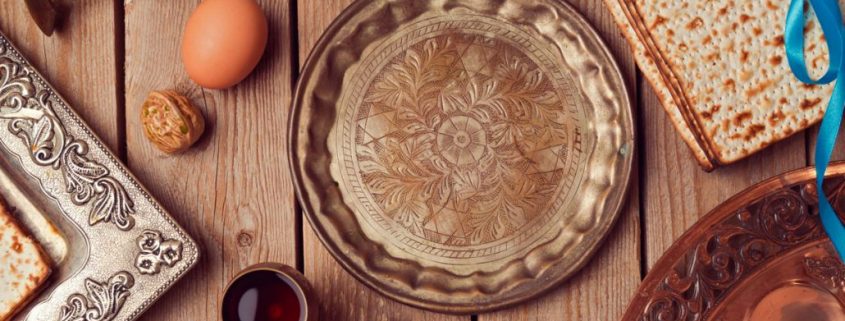Passover: Promise and Fulfillment
The Feast of Passover commemorates God’s redemption of Israel from its 400-year enslavement in Egypt. Over 3,000 years ago, the children of Israel suffered under the severe oppression of the Pharaoh. As the Book of Exodus records, God sent Moses to deliver them from the Egyptians, but Pharaoh refused to let the Israelites leave Egypt for the Promised Land.
Due to the hardness of Pharaoh’s heart, God proceeded to pour out a series of ten plagues upon the Egyptians, culminating in the final plague, the slaying of firstborn sons of Egypt. God protected the Israelite children with the marking of the doorposts and the lintels of their homes with the blood of a lamb (Ex. 12:1-30).
The Jewish people commemorate this event every year through a ceremonial meal known as the Passover Seder. Throughout the world, Jewish families gather to remember the events of the Exodus and to celebrate the faithfulness of the God of Israel. The word “seder,” which in this instance means order or procedure, refers to the retelling of the account through a special book known as the “haggadah” (telling of the story). One of the most important purposes of the Passover Seder is to teach the sacred history of the Jewish people to the children of each emerging Jewish generation.
There is an added dimension of celebration for Jewish and non-Jewish followers of Jesus the Messiah, for Jesus celebrated this meal with His disciples on the evening before His death. Known in Christian faith as the Last Supper (Mat. 26:17-30), the New Testament records how the Passover elements of the unleavened bread and the wine have become the basis of the Lord’s Supper, or Communion.
As Jesus and the disciples celebrated God’s redemption of Israel, Jesus foretold how His death would provide redemption from sin (Mat. 26:26-29). The themes of Passover prepared the nation for the redemption God provides through Jesus’ death and resurrection.

Enslavement
Passover
The children of Israel served as slaves under the oppression of the Pharaoh (Ex. 1:11-12; 6:6).
The Messiah
After Adam and Eve’s rebellion, humanity fell under the oppression of slavery to sin and death (Rom. 6:20-21; Eph. 2:1-3).
 The Lamb
The Lamb
Passover
God redeemed Israel through the sacrifice of a lamb without any defect (Ex. 12:5). He instructed the people to sacrifice the lamb and to spread the blood upon the doorposts of their homes with hyssop (Ex. 12:21-22).
The Messiah
John describes Jesus as “the Lamb of God, who takes away the sin of the world” (John 1:29). In the same way as the Passover lamb was without defect, Jesus was without sin (2 Cor. 5:21). This is why Paul tells us to remember how the “Messiah, our Passover Lamb, has been sacrificed” (I Cor. 5:7).
Blood
Passover
God redeemed Israel from Egypt through the shedding of blood. When God passed through the land of Egypt, He saw the blood of the lamb on the top and sides of the doorframe; therefore, He passed over the Israelite homes and did not allow the destroyer to take the lives of their firstborn sons (Ex. 12:23).
The Messiah
The Bible teaches us that without the shedding of blood there is no forgiveness for sins (Heb. 9:22). Jesus tells us that through His blood, He provides the forgiveness of sin (Mat. 26:28). He is the Lamb who was wounded for our transgressions and bruised for our iniquities (Isaiah 53:5).
 Matzah
Matzah
Passover
During the week of Passover, the Jewish community abstains from eating anything containing leaven and eats only unleavened bread, or matzah (Ex. 12:19-20). When the Israelites fled Egypt in haste, they did not have time to wait for the bread to rise while it baked.
The Messiah
The Bible presents leaven as a symbol of sin (Mat. 16:6-12; 1 Cor. 5:6-8). Jesus was without sin, meaning without leaven (2 Cor. 5:21). Symbolically, Jesus was crucified at the beginning of the Feast of Unleavened Bread.
 Bitter Herbs
Bitter Herbs
Passover
The Torah prescribes three necessary elements of Passover: the Lamb, Matzah and Bitter Herbs (Ex. 12:8). The bitter herbs remind the Israelites of how the Egyptians embittered the lives of the slaves in Egypt.
The Messiah
For believers, the bitter herbs represent how Jesus delivers His people from the bitterness and sorrow of sin and brings joy to our lives.
Redemption
Passover
The story of Passover represents God’s redemption of Israel out of Egypt.
The Messiah
God fittingly chose the celebration of Israel’s redemption from Egypt as the day to redeem the world through Jesus’ death and resurrection.
Land
Passover
God delivered the children of Israel out of Egypt in order to bring them into the Promised Land.
The Messiah
In the same way, God delivers followers of Jesus from a dominion of darkness to bring them into His kingdom (Col. 1:13), and reminds us that one day God will fulfill His promise to establish His earthly kingdom in Jerusalem.
First Fruits
Passover
Following Passover, God commanded the nation to offer the first fruits of their harvest on the first day following the Sabbath; therefore, on the Sunday following Passover, God instructs Israel to offer the first fruits of their harvest as an offering (Lev. 23:9-14).
The Messiah
On the Sunday following Passover, Jesus conquered death and rose from the dead, coinciding with the Feast of First Fruits. As the first fruit of the resurrection, Jesus gives hope to His people that they shall likewise follow Him into eternal life (1 Cor. 15:20-23).



